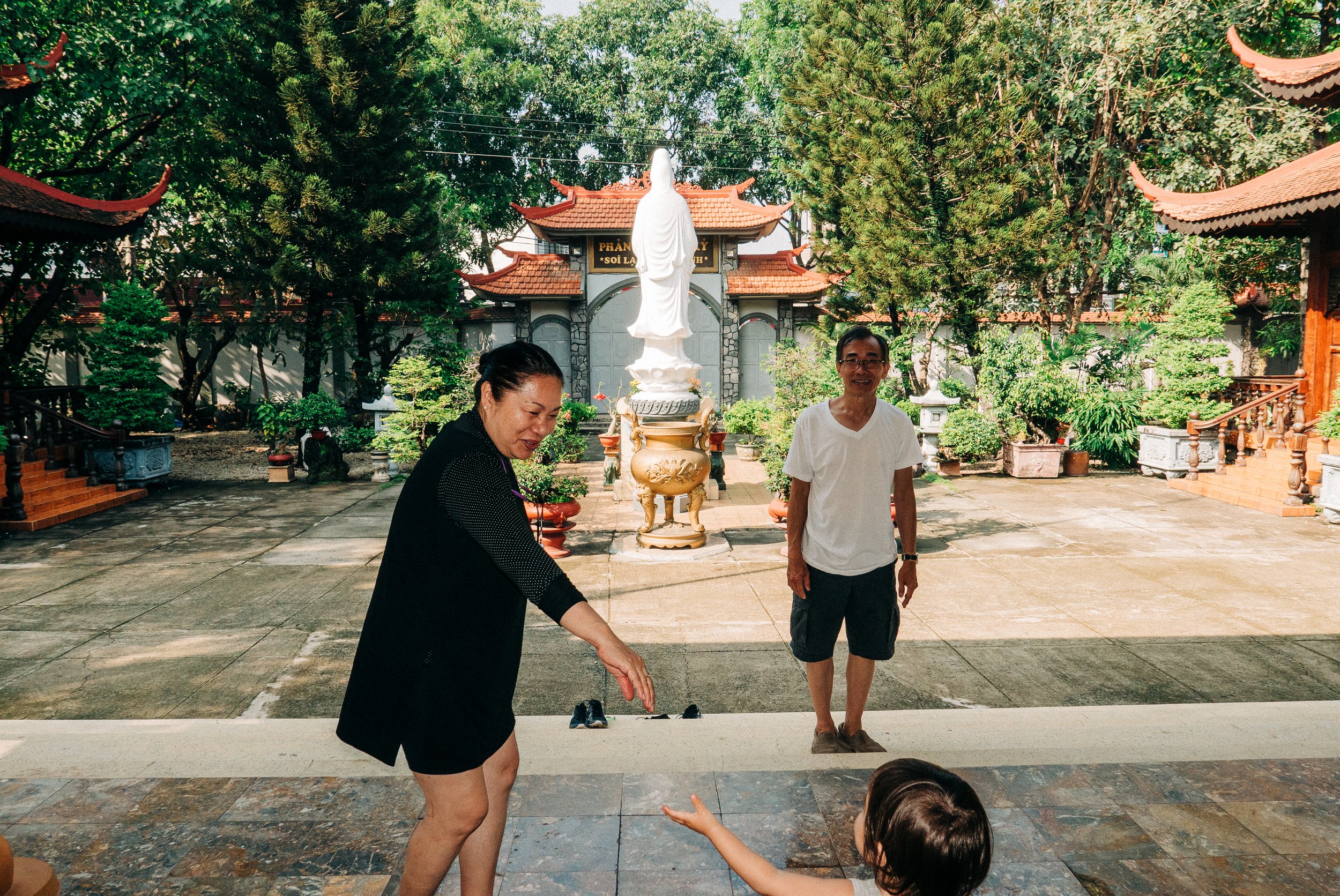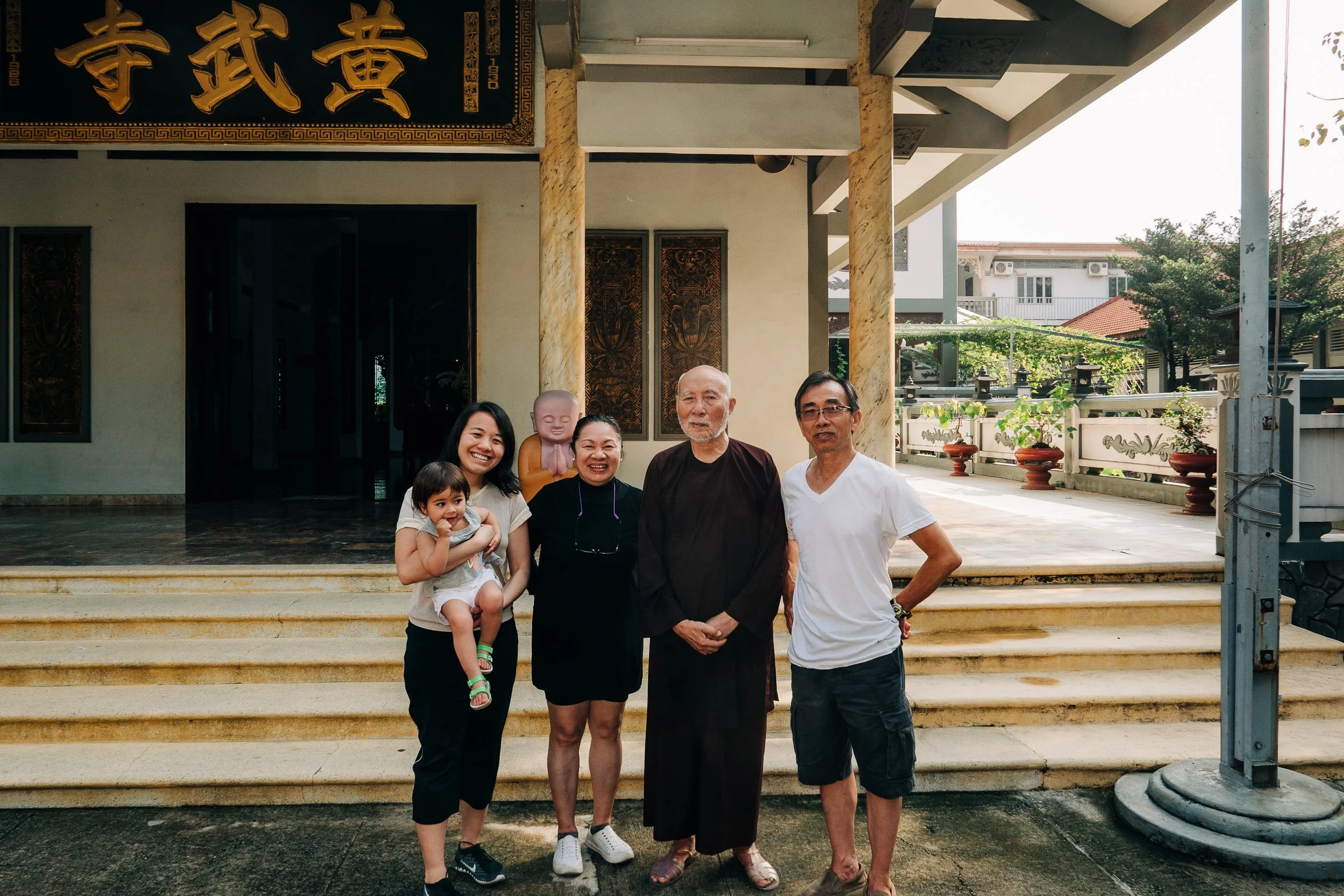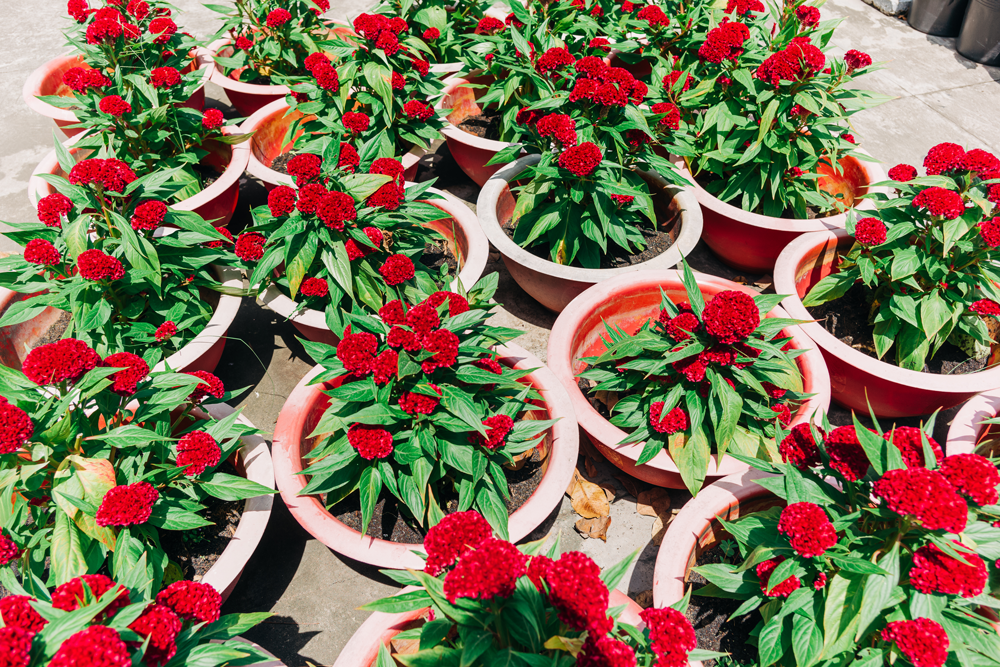
49 Days of Blessings
in Honor of Tee Thơ Tran
On March 10 the monks of Tue Quang Zen Temple conducted a ceremony commemorating the final day of the 49-day blessing period. The monks interred Tee’s ashes to the stupa built to house the ashes of ancestors and relatives of the Huỳnh Lê family, who had built the temple and donated it to the ‘Most Venerable’ Thich Thanh Tu.
Although Tee was not a blood relative, Mrs. Lê Thị Lan, her husband – and beloved uncle of Chánh – Mr. Ma Thanh Cong (ordained as Thich Truc Thong Hieu), and their children Đạt, Huy, Việt and Thiện invited Tee’s family to lay her ashes in the stupa in honor of her goodness, integrity and generosity.
Samsara - The Significance of 49 Days
Buddha's teachings talk about Samsara, the cycle of reincarnation, the succession of life and death, the transmigration from life to life of sentient beings. When a person has just died, his/her soul will be reborn in a new life. Where the soul is reincarnated depends on the moral quality of the previous life's actions. The soul may take the form of a deva, a human, a god, an animal, a hungry ghost or a hell creature. Only, Buddhas and Bodhisattvas are liberated from Samsara.
After death, the soul may be reborn in a new body instantly, but often it takes up to 49 days. Why? When alive, most people are attached to their husbands/wives, children, properties, wealth, etc…. So when they die, their souls still wander around these. Those who had many past sins are often lost in darkness and endure unspeakable sufferings.
In order to add merits to the beloved deceased, during this 49-day period, children and near relatives should cultivate virtues, give alms, free lives, make offerings... to pray for the soul to quickly overcome lust and love, to get rid of attachments and quickly be reborn in a new better place. That is the purpose of the “cầu siêu” or “prayer for transcendence”. The monks and the family will gather to recite sutras, and conduct ritual praying sessions, every week for 7 continuous weeks. This relatives’ devotion along with the spiritual positive energy of the monks’ prayers are all dedicated to the dead person. Then the soul will rely on the merits and will be reborn to a new life.
History of Tue Quang Zen Temple
In 1777, Mr. Huynh Van Chung followed Lord Nguyen Anh (future Emperor Gia Long of the Nguyen dynasty- 1802-1820) from Central Vietnam towards Saigon in his run southwards to escape the Tây Sơn rebellion. Arriving in Gia Dinh province (now known as Saigon or Ho Chi Minh City), Mr. Huynh Van Chung settled down in Thu Duc village.
In 1930, his fifth grandson, district governor Huynh Huu Nho, built Huynh Vo pagoda and named it after his parents’ surnames - Huynh Huu The and Vo Thi So. Chùa Huynh Vo was a place to worship the Buddha and ancestors, and even had a cemetery for the family.
In 1942, Mr. Huynh Huu Nho's daughter, Mrs. Huynh Thi Nga (1927-2004) moved to Hanoi with her husband, Dr. Le Quang Phu (1914-1946). Professor at the Medical University of Indochina in Hanoi, Dr. Le Quang Phu, MD, PharmD also owned a pharmaceutical laboratory manufacturing vaccines for plague, cholera, and smallpox. He was assassinated by the Viet Minh at the end of 1946 for political disagreement.
After her husband‘s death, Mrs. Nga returned to the South with her two daughters, Le Thi Lan (1945-) and Le Thi My (1946-), to live with her parents in Thu Duc. In 1960, she bought 33 hectares of wasteland and reed forest around the pagoda and cleared the land to cultivate rubber trees.
Seven years later (1967), Mrs. Nga donated Chua Huynh Vo with 5 hectares of rubber plantation to four Venerable Buddhist monks to build an institute for Buddhist studies, as a place for research and translation of Buddhist scriptures. However, due to the war in Vietnam, the project was cancelled.
In 1996, the Vietnamese government confiscated Mrs. Nga's plantation, including Huynh Vo pagoda to build the Saigon Linh Trung Export Processing Zone. Chua Huynh Vo had to be relocated to a nearby area of .6 hectare, having pertained to Mrs. Nga as consolation, which the government gave back as compensation.
In 1997, Mrs. Lan reconstructed the new temple. Many relics from the old monastery were brought over, such as the statue of Avalokiteshvara (the Bodhisattva of compassion), the picture of Bodhidharma Patriarch, the remnants of wooden pillars, the big bell, the Bodhi tree, the Frangipani trees... In this temple, a commemorative stupa was built to house the ashes of ancestors and relatives.
In 1998, Mrs. Nga and her two daughters donated the Huynh Vo pagoda to Venerable Thich Thanh Tu. Huynh Vo pagoda changed its name to Tue Quang meditation temple, and practised under the ‘Truc Lam meditation school of Thien sư Thich Thanh Tu’. Its current address is at 13 Linh Trung street, Linh Trung Ward, Thu Duc City.
In the same year, Mrs. Nga entered the monastery order at Truc Lam Zen Temple in Dalat. Bhiksuni Thich Nu Hue Dinh peacefully passed away in 2004 at the age of 78. Her ashes are still conserved in a stupa built for her, at Tuệ Quang temple, near the stupa of her ancestors.
In 2005, Mrs. Lan’s husband, Ma Thanh Cong PhD (1942 - ) was ordained at Tue Quang temple with the Dharma name of Thich Truc Thong Hieu. Despite living with a chronic illness, he is still very active, translating many Buddhist writings from Chinese to Vietnamese, and teaches Chinese sutras to lay Buddhists. His title in Tue Quang community is “Giao tho” (meaning Dharma teacher) and his students address him as "Lao su" (a Chinese word that means Master, Teacher). He also has had a few books translated together with Mrs. Lan from Vietnamese to French.
What is Meditation/Thien/Zen?
Unlike the Pure Land cultivation practice, reciting Amitaba's name to seek rebirth in the Pure Land, Meditation practice is based on the Buddha’s teaching: "Our pure consciousness empty of all thoughts is our true Mind, our Buddha. There is no Buddha outside". Thus, we must first understand our Buddha mind, our true nature to be in the Buddhist Meditation.
In Vietnam, Thien sư Thich Thanh Tu (1924–) has been one of the most prominent and influential Thien masters currently alive. With more than 60 temples built from South to North Vietnam (including Thiền Viện Truc Lam Tue Quang), he has been credited for renovating the Truc Lam meditation school originally founded by the Vietnamese monk-emperor Tran Nhan Tong (1258–1308). His teaching is based on “hang tri hang giac”: "be aware and awake to the present moment”, consistently, without any distraction, without adding, subtracting any thought, or judging anything. Meditation helps to return to the original state of our being, a clear, silent, empty state of mind.
Besides, his Vietnamese contemporary, the “father of Mindfulness” Thiền sư Thích Nhat Hanh (1926–2022), founder of the famous Plum Village in France, was the pioneer bringing the art of Mindful living in the West, developing new ways to apply Buddhist wisdom to the challenges of modern life.
Mindfulness meditation is the practice of touching life deeply in every moment of daily life. To be mindful is to be truly alive, truly present, at one with those around you, with you, and with what you are doing. We can bring our body and mind into harmony when we are doing all our daily activities, while we are washing the dishes, driving the car, taking our shower, when we are walking, sitting or lying down.
Make a donation to Tue Quang Zen Temple
For those interested in making a charitable donation in honor of Tee, we are collecting funds to donate to the temple, which will help support their meditation and community programs, in addition to the maintenance of the stupa and the temple grounds.
If you cannot donate using any of these methods, please email teethotran.memorial@gmail.com
-
You can send your donation to Tee’s daughter, Jacky Tran here: https://www.paypal.com/paypalme/waxyjax
-
You can also send a donation via Venmo to @waxyjax / QR Code
-
You can also send a donation via Zelle to +1 (646) 468-4919 / QR Code
-
To transfer a donation from outside of Vietnam:
Bank: VIETCOMBANK
Account name: PHAN HUU LOC
Account number: 0381000591555
To Transfer a donation from a Vietnamese bank account:
Bank: VIETCOMBANK
Bank address: 198 TRAN QUANG KHAI, LY THAI TO WARD, HOAN KIEM DISTRICT, HANOI, VIETNAM
Swift code: BFTVVNVX
Account name: PHAN HUU LOC
Account number: 0381000591555










